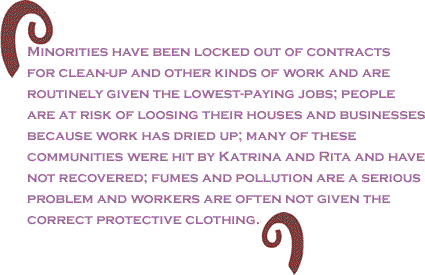| The
big story about the NAACP convention meeting in Kansas City
was whether President Obama would come or not.� But I think
that Ben Jealous hit the right nerve in his opening speech
to the Convention when he delivered a report that organization
had put together from a series of meetings in affected communities
in the Gulf area where the oil spill occurred.��
The
Report found that minorities have been locked out of contracts
for clean-up and other kinds of work and are routinely given
the lowest-paying jobs; people are at risk of loosing their
houses and businesses because work has dried up; many of
these communities were hit by Katrina and Rita and have
not recovered; fumes and pollution are a serious problem
and workers are often not given the correct protective clothing.�
Lisa Jackson, head of the Environmental Protection Agency
also spoke at the Convention and backed up the findings
in the report and vowed to work with communities to produce
clean water, clean land.

However,
it seems to me that a civil rights operation needs to move
into the oil clean-up operation that bring about a strong
element of fairness to that situation.�� When Katrina hit,
we heard that the companies involved in the clean-up were
importing workers from Korea, Mexico and Vietnam at the
lowest wages to work the reconstruction.� Many of them are
still there and they provide competition with many workers
who actually live in the area and have been deprived not
just of a job, but of their entire livelihood if things
don�t improve.� They have the most stake in the outcome
of the reconstruction.�
I
was listening to National Public Radio station the other
day and John Boyd, President of the National Association
of Black Farmers was being interviewed.� It seems that many
of his members are farmers whose land has been desecrated
by the oil spill and fishermen whose livelihood was made
on the water.� But their complaint is that BP has bypassed
them in looking for other farmers and fishermen whose land
and waters have been polluted.� This is important because
black farmers and fishermen have a claim to the same kind
of financial reparations that are being made available to
whites in the area and they want and deserve a big piece
of the clean-up work that is going on.�� However, Boyd says
that Black fishermen seeking jobs with the clean-up crew
have been brushed off.

Again
Lisa Jackson�s agency seems to be the only one that has
an SBA participation program with respect to soil and water,
chemistry, waste disposal but Black owned public relations
firms like Bright Moments in New Orleans are awaiting proposals
to community outreach messaging, but none have come from
BP.� Apparently, they believe that national adds showing
an Africa American male who lives in the area and is �in
charge� of claims will suffice to show that they are sensitive
to the problem.� This, together with what appears to be
a national media blackout of this problem hides a monumental
race issue with respect to the oil spill.�
 Ken
Feinberg has been placed in charge of processing the claims
associated with the oil spill, since the President has wrested
$20 Billion from BP.� But Feinberg was recently on CNN discussing
the claims process but said nothing about the safeguards
placed on the money would allow it to be distributed fairly,
not just to selected individuals but to communities as well.��
The Nation Congress of American Indians has called for a
meeting in New Orleans to discuss why the Native American
community in the Gulf has been overlooked with respect their
access to resources in the clean-up.�� The black community
interest is not just vested in workers, one black fisherman
stands to loose more than $100,000 from his shrimp business,
but he can�t get remediation contracts for the destruction
of their fishing grounds. Ken
Feinberg has been placed in charge of processing the claims
associated with the oil spill, since the President has wrested
$20 Billion from BP.� But Feinberg was recently on CNN discussing
the claims process but said nothing about the safeguards
placed on the money would allow it to be distributed fairly,
not just to selected individuals but to communities as well.��
The Nation Congress of American Indians has called for a
meeting in New Orleans to discuss why the Native American
community in the Gulf has been overlooked with respect their
access to resources in the clean-up.�� The black community
interest is not just vested in workers, one black fisherman
stands to loose more than $100,000 from his shrimp business,
but he can�t get remediation contracts for the destruction
of their fishing grounds.

What�s
happening here is old style racism and kudos to the NAACP,
but the Justice Department needs to get involved and not
just leave the EPA down there to fend off blacks seeking
distributive justice for the damage to their lives.� This
is another racial issue for the administration and it will
be interesting to see how they handle it.
BlackCommentator.com Editorial Board member, Dr. Ron Walters, PhD is a Political Analyst, Author and Professor
Emeritus of Government and Politics at the University of Maryland, College Park. One of his latest books is: The Price of Racial Reconciliation (The Politics of Race and Ethnicity) (University of Michigan Press)Click here to contact Dr. Walters. |

